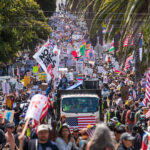Pese a la comodidad que podrían tener en un refugio o en la Casa del Migrante de Ciudad Juárez, un grupo, integrado principalmente por ciudadanos de Venezuela y Colombia, prefiere esperar a que llegue la madrugada para cruzar y acercarse a la valla que divide a México y Estados Unidos.
Entre los viajeros forzados está Renny Luzardo, originario del estado de Zulia, en Venezuela, a quien la pobreza en su país, provocada por el régimen político y la delincuencia, lo tiene ahora a la intemperie a unos metros del río Bravo.
En Venezuela era trabajador en cadena de restaurantes, especializado en barman, mesonería y servicios de cocina; lamentablemente en Venezuela eso pasó a segundo plano, porque el gobierno acabó con todo lo que era la economía. Ya creo que en muchos países se han dado cuenta que el bolívar ya no cuenta en Venezuela, se trabaja con dólares porque el venezolano así buscó una manera de sobrevivir”, señala.
The distance between Zulia and Ciudad Juárez, if traveled by air, is approximately 5,000 kilometers, but by land it can be more. Renny Luzardo started this journey in June of this year, when he decided to sell some properties to travel to the United States, because he could no longer afford to pay what the criminals demanded, that extortion that in Mexico is called “derechos de piso” (protection payments).
There, it is called ‘vacuna’ (vaccine), they vaccinate you, and once you are vaccinated, you have to pay a fee, sometimes even higher than the earnings from your business. And if you didn’t, unfortunately, the criminals would harm your family or your business and you personally,” he explains.
Renny’s journey began by crossing the border in Colombia, then reaching Panama and traveling through Central America until reaching the Guatemala-Mexico border, to enter through Ciudad Hidalgo.
Leaving his family without a refrigerator, without a house, without a car, without anything; whatever little you had there, you had to sell it to make this journey,” he says.
Renny managed to reach Ciudad Juárez, he says that he is expected in the United States, a requirement requested by the CBP-One application. He only has three more obstacles to overcome: crossing the Rio Bravo, passing the barbed wire fence and gate, and being selected by Border Patrol to cross through Gate 36. He has hope.
That they, on the other side, open the doors for us and create a file for us, or take our information and allow those who are eligible to pass, because we come to work, we don’t come to do anything else, we come to work, my sir,” the migrant said, with a trembling voice.









